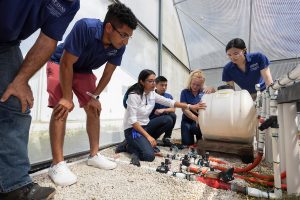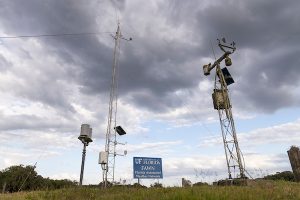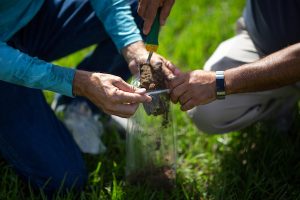FORT PIERCE, Fla.—Hurricane Debby, the 2024 Hurricane season’s first storm, plundered coastal communities along Florida’s Big Bend as a Category 1 Hurricane on Sunday, Aug. 4 and Monday, Aug. 5.
However, along Tampa and into the middle of the state, residents began to feel rain bands and mild winds early on August 4. On Tuesday, Aug. 6, the remnants of Debby still bring light to heavier rains at the University of Florida Institute of Food and Agricultural Science’s Indian River Research and Education Center in Fort Pierce, Florida.
Here, Smart Irrigation and Hydrology Laboratory team members provide tips to producers who operate commercial agricultural fields and homeowners who garden or care for a sprawling lawn.
Dr. Sandra Guzman leads the Smart Irrigation and Hydrology Laboratory

Sandra Guzmán (white shirt) having a discussion with students in a greenhouse at the Indian River Research and Education Center (IRREC).
Sandra Guzmán, Assistant Professor of Agriculture and Biological Engineering, leads the Smart Irrigation and Hydrology Laboratory. Guzman’s team assists producers by providing information on the volume of rain influencing their fields.
Florida Automated Weather Network (FAWN)

“Daily rain data from the producer’s field can provide insights into the water management plans that need to be in place over the following weeks. Growers should visit their nearest Florida Automated Weather Network (FAWN) station for more information,” said Guzmán.
“Our lab provides weather updates to our grower affiliates so they can have information on how rain is impacting their fields.”

Akshara Atthelly, Ph.D. Candidate
Guzman said her team, including graduate student Akshara Athelly, a Ph.D. candidate, sent emails with weather updates to growers about water status following Hurricane Debby. Athelly advised, “The immediate step growers can take is to check the volume of rain received and their drainage systems, as excess water in soil could significantly affect crop production.”
Leaching rain event
Athelly explained, “According to the Florida Department of Agriculture and Consumer Services, a leaching rain event is considered to be a cumulative rainfall of 3 inches in 3 days or 4 inches in 7 days. Based on the crop growth stage, supplemental nitrogen fertilizer can apply if a leaching rain event occurred on your farm due to Hurricane Debby.”
Guzmán and Athelly recommend that growers and landowners can contact a nearby county extension agent to obtain a soil bag for soil tests, as the soil salt and nutrient levels are affected by the hurricane UF/IFAS soil test.

Get a soil text bag and submit to UF/IFAS Lab in Gainesville
In St. Lucie County, landowners may contact the UF/IFAS Extension, St. Lucie for the test bag. The bag will need to sent to the University of Florida Extension Soil Testing Laboratory in Gainesville for processing.
Additionally, Athelly noted, “Crops that have endured hurricane stress also need to be evaluated for fungal infections and pathogens, which can cause diseases. Another critical factor to check for is the lodging of plants, which weakens the stems and roots, and corrective actions can help them recuperate.”

For more information about the work at the UF/IFAS Indian River Research and Education Center, access the webpages at https://abe.ufl.edu/people/faculty/sandra-guzman/.
Featured image by darekb22 – stock.adobe.com
 5
5
